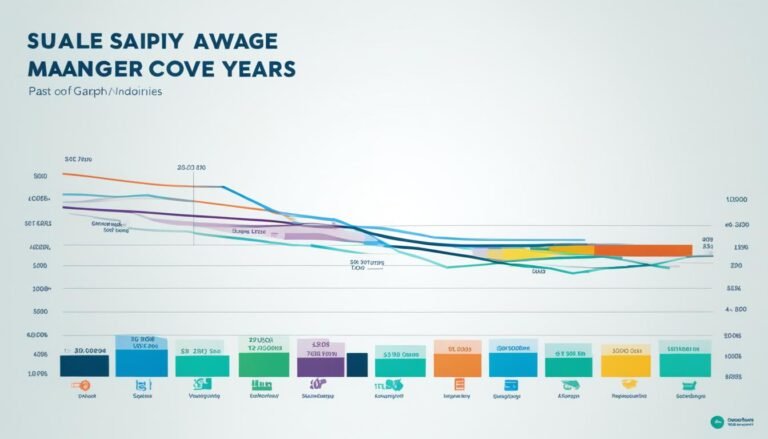Agile Training for Project Managers: Elevate Your Leadership with Agile Methodologies
|
Getting your Trinity Audio player ready...
|
Agile training for project managers is essential for enhancing leadership skills and mastering agile methodologies. By enrolling in agile training courses, project managers can gain skills in agile software development, project management, scrum, collaboration, leadership, communication, and more. Acquiring these skills is crucial in today’s dynamic business environment, where agility and adaptability are key to success.
As project managers navigate complex projects and changing requirements, they need to be equipped with the tools and knowledge to respond effectively. Agile training provides project managers with the expertise to embrace ambiguity, foster collaboration, and deliver value to stakeholders.
Key Takeaways:
- Agile training enhances leadership skills and equips project managers with agile methodologies.
- Skills gained in agile training include agile software development, project management, scrum, collaboration, leadership, and communication.
- Agile training enables project managers to navigate complex projects and changing requirements.
- Agile training fosters adaptability, collaboration, and the delivery of value to stakeholders.
- Being agile is crucial in today’s dynamic business environment.
The Benefits of Agile Project Management
Agile project management is a highly effective approach that offers numerous benefits to project managers and organizations. By adopting agile methodologies, businesses can achieve higher quality products, better project control, increased return on investment (ROI), and improved customer satisfaction.
One of the key advantages of agile project management is its emphasis on adaptability. Agile methodologies allow project teams to respond quickly to changing project requirements and market conditions. This flexibility enables businesses to stay ahead of competitors and deliver products that meet evolving customer needs.
Collaboration is another essential aspect of agile project management. By fostering strong teamwork and cross-functional collaboration, agile methodologies enable project managers to leverage the diverse skills and expertise of their team members. This collaborative approach promotes innovation, boosts productivity, and enhances overall project performance.
Continuous improvement is at the core of agile project management. Through iterative cycles of planning, execution, and review, project managers can continuously refine their processes and deliver incremental value to stakeholders. This iterative approach ensures that projects are regularly reviewed and adjusted based on insights gained, leading to more successful outcomes.
To fully reap the benefits of agile project management, project managers should consider undergoing agile project management training. This specialized training equips them with the knowledge, skills, and strategies needed to effectively implement agile methodologies in their projects. Through project management training, project managers can enhance their ability to lead agile teams, optimize project performance, and deliver successful outcomes.
Project management training also provides project managers with a deeper understanding of agile principles and best practices. It enables them to master essential agile tools and techniques, such as scrum, Kanban, and lean management, enhancing their ability to facilitate and manage agile projects effectively.
By embracing agile project management and investing in project management training, project managers can unlock a world of possibilities. They can navigate the complexities of modern projects with ease, drive innovation, and deliver exceptional results. The benefits of agile project management extend far beyond individual projects, offering organizations a competitive edge in today’s dynamic market.
In the next section, we will explore the advantages of obtaining an agile project management certification and how it can further enhance project managers’ expertise and career prospects.
The Agile Project Management Certification Advantage
An agile project management certification is a formal confirmation of an individual’s skills and abilities to manage projects effectively in an agile environment. It is a valuable credential that can elevate a project manager’s career and open doors to new opportunities. By obtaining an agile project management certification, professionals demonstrate their commitment to mastering agile methodologies and staying up to date with industry best practices.
Agile project management certification programs provide comprehensive training in agile techniques and core concepts. These programs cover a range of topics, including agile project planning, iterative development, continuous improvement, stakeholder collaboration, and adaptive leadership. Through a combination of coursework, case studies, and hands-on exercises, participants gain the knowledge and practical skills necessary to succeed in managing projects using agile methodologies.
One of the key advantages of acquiring an agile project management certification is the enhanced credibility it brings. Employers and clients recognize certified professionals as individuals who have undergone rigorous training and possess the expertise to deliver successful projects in dynamic, fast-paced environments. The certification adds value to a project manager’s resume, increasing their marketability and improving their chances of securing desirable job opportunities.
“Obtaining an agile project management certification has been a game-changer in my career. It has not only expanded my knowledge and skills in agile methodologies but has also opened doors to exciting project management roles.” – Jane Smith, Agile Project Manager
Furthermore, agile project management certification provides professionals with a competitive edge in the job market. As agile methodologies gain prominence across industries, organizations are increasingly seeking project managers who can drive successful projects using agile practices. Having a recognized certification in agile project management sets professionals apart from their peers and increases their chances of securing key positions within organizations that value agile project management expertise.
Whether you are an experienced project manager looking to advance your career or a newcomer to the field seeking to establish a strong foundation in agile project management, obtaining an agile project management certification is a wise investment. It equips professionals with the necessary skills, knowledge, and credentials to excel in managing projects using agile methodologies, ensuring their ability to deliver value, adapt to changing requirements, and meet the evolving needs of projects and stakeholders.
| Benefits of Agile Project Management Certification | Agile Project Management Certification Programs |
|---|---|
|
|
Understanding Agile Project Management
Agile project management is an iterative approach that involves breaking down large projects into smaller, more manageable iterations known as sprints. This methodology allows for frequent feedback from customers and stakeholders, enabling continuous improvement throughout the project lifecycle. One popular framework used in agile project management is Scrum, which emphasizes collaboration, adaptability, and delivering value to customers.
With agile project management, the focus is on flexibility and responsiveness to changing project requirements. It promotes effective communication, encourages cross-functional teams, and fosters a culture of collaboration. By adopting agile methodologies, project managers can streamline their processes, increase team productivity, and ensure project success.
Scrum, in particular, is a lightweight framework that facilitates the delivery of complex projects by promoting self-organizing teams and iterative development. It utilizes short ‘sprints’ to complete specific project tasks and encourages transparency and regular communication among team members. Through Scrum training, project managers can gain a deeper understanding of this framework and develop the skills required to effectively implement it in their projects.
“Agile project management provides a structured yet flexible approach to project execution, allowing teams to adapt to changing requirements and deliver high-quality results. Scrum training equips project managers with the knowledge and tools they need to embrace agile practices and guide their teams towards success.”
The Agile Methodology
The agile methodology is built on the principles outlined in the Agile Manifesto, which values individuals and interactions, working solutions, customer collaboration, and responding to change. By incorporating iterative and incremental development, agile methodology enables project managers to create high-quality deliverables while fostering a culture of continuous learning and improvement.
Benefits of Scrum Training
Scrum training provides project managers with the skills to effectively apply the Scrum framework and lead their teams to successful project outcomes. By undergoing Scrum training, project managers can:
- Improve collaboration and communication within their teams
- Enhance their ability to adapt to changing project requirements
- Optimize project planning and tracking
- Maximize customer value and satisfaction
- Build self-organizing and high-performing teams
Overall, understanding agile project management and undergoing Scrum training equips project managers with the knowledge and skills necessary to navigate the complexities of agile projects, deliver value to customers, and drive project success.
Top Agile Project Management Courses
If you’re a project manager looking to enhance your skills and knowledge in agile project management, there are numerous agile training courses available. These courses cover a wide range of topics, including agile software development, leadership, communication, strategy, planning, and risk management. By enrolling in these courses, you can further develop your project management skills and become a more effective agile project manager.
Here are some popular agile project management courses that can help you elevate your project management skills:
- Agile Project Management from Google: This course offers a comprehensive overview of agile project management principles and techniques. It covers topics such as agile frameworks, methodologies, and best practices.
- Introduction to Agile Development and Scrum from IBM: This course provides an introduction to agile development and Scrum, one of the most widely used agile frameworks. It covers the core concepts and principles of Scrum, as well as its implementation in real-world projects.
- Agile Leadership from the University of Colorado System: This course focuses on agile leadership, equipping project managers with the necessary skills to lead agile teams. It covers topics such as agile leadership principles, team dynamics, and effective decision-making in agile environments.
These agile project management courses are designed to provide you with the knowledge and skills needed to successfully manage agile projects. By completing these courses, you’ll be equipped with the tools and techniques to drive successful projects, deliver value to customers, and adapt to changing project requirements.
| Course | Description |
|---|---|
| Agile Project Management from Google | Comprehensive overview of agile project management principles and techniques. |
| Introduction to Agile Development and Scrum from IBM | Introduction to agile development and Scrum, covering core concepts and principles. |
| Agile Leadership from the University of Colorado System | Focused on agile leadership, equipping project managers with necessary skills to lead agile teams. |
Agile Project Management Certifications
When it comes to validating your knowledge and skills in agile principles and techniques, there are several agile project management certifications available. These certifications serve as formal confirmation of your expertise in managing projects effectively within an agile environment.
Here are some of the most recognized agile project management certifications:
- The PMI Agile Certified Practitioner (PMI-ACP) certification
- The PRINCE2 Agile Project Management certification
- The Certified Scrum Master (CSM) certification
- The Certified SAFe Agilist (SA) certification
Each certification program has its own unique set of requirements, domains covered, and associated costs. Obtaining an agile project management certification demonstrates your commitment to agile methodologies and adds value to your resume.
By enrolling in agile project management training courses, you can acquire the necessary knowledge and skills to prepare for these certifications. These courses cover a range of agile techniques and core concepts that are essential for success in agile project management.
Key Takeaways
Agile project management certifications validate your knowledge and skills in agile principles and techniques. Some recognized certifications include the PMI-ACP, PRINCE2 Agile, CSM, and SA certifications. By undergoing agile project management training, you can enhance your expertise and increase your chances of certification success.
Whether you’re a seasoned project manager or just starting your career, obtaining an agile project management certification can significantly boost your professional development and open up new opportunities in the field.
| Certification | Requirements | Domains Covered | Cost |
|---|---|---|---|
| PMI-ACP | 2,000 hours of general project management experience, 1,500 hours of agile project management experience | Agile tools and techniques, agile knowledge and skills, stakeholder engagement, team performance | $435 (PMI members), $495 (non-members) |
| PRINCE2 Agile | None specified | Combining PRINCE2 principles with agile ways of working | Varies depending on training provider |
| CSM | Attend a two-day Certified ScrumMaster course | Scrum framework, Scrum roles, Scrum meetings, Scrum artifacts | Varies depending on training provider |
| SA | None specified | Lean-Agile mindset, SAFe principles, SAFe practices, SAFe leadership | $100 renewal fee every year |
Agile Certificate Online Course from Purdue University
Purdue University offers an Agile Certificate Online Course that equips learners with the latest agile tools and methods. This instructor-led course is aligned with the Agile Practice Guide of the Project Management Institute and covers topics such as agile vs. traditional project management, project life cycles, implementing agile, popular agile approaches, measuring agile projects, and more.
By enrolling in this course, project managers can gain comprehensive knowledge and practical skills in agile project management. The course is designed to enhance their understanding of agile methodologies and equip them with the necessary tools and techniques to lead successful agile projects.
This online course is suitable for both aspiring project managers who want to kickstart their career in agile project management and experienced professionals looking to upgrade their skills. The course is conducted online, allowing learners to study at their own pace from anywhere in the world.
Throughout the five-week course, learners will engage in interactive discussions, practical exercises, and real-world case studies to reinforce their understanding of agile project management concepts.
Upon completion of the course, participants will receive a certificate from Purdue University, validating their achievement and demonstrating their proficiency in agile project management.
“The Agile Certificate Online Course from Purdue University provided me with valuable insights and practical knowledge on agile project management. The instructor-led sessions and hands-on exercises helped me understand how to apply agile principles to my projects effectively. I highly recommend this course to anyone looking to enhance their project management skills.”
— John Smith, Project Manager
Course Highlights:
- Instructor-led online course
- Aligned with the Agile Practice Guide of the Project Management Institute
- Covers key topics in agile project management
- Interactive discussions and practical exercises
- Real-world case studies
- Flexible learning schedule
- Certificate of completion from Purdue University
Join the Agile Certificate Online Course from Purdue University and enhance your project management skills with agile methodologies. Gain the knowledge and certification you need to excel in the fast-paced world of agile project management.
Program Outcomes and Career Opportunities
Upon completing agile training and earning a project management certification, learners can expect to gain a deep understanding of agile project management concepts and tools. This comprehensive training equips project managers with the necessary skills to excel in agile environments and drive successful projects.
Program Outcomes
- Define Agile Project Management: Learners will become proficient in defining and understanding agile project management methodologies, principles, and best practices.
- Summarize the Agile Mindset and Manifesto: Through training, project managers will grasp the fundamental values and principles that guide an agile approach.
- Explain Implementation and Management of Agile Projects: Project managers will acquire the knowledge and skills to plan, execute, and manage agile projects using agile techniques and frameworks.
- Describe Popular Agile Approaches: Training will cover various agile approaches, such as Scrum, Kanban, and Lean, enabling project managers to choose the most suitable methodology for their projects.
- Apply Measurement Methods for Ongoing Success: Learners will be equipped to measure project progress, evaluate team performance, and identify areas for continuous improvement.
This comprehensive training in agile project management will empower project managers to effectively lead teams, adapt to changing project requirements, and deliver value to stakeholders. By honing their project management skills through agile training, professionals can elevate their careers and explore new opportunities in the field.
Career Opportunities
Acquiring project management certification and agile training opens up a wide range of career opportunities for professionals in the field. Some of the potential roles for agile project managers and certified Scrum masters include:
- Agile Project Manager: Responsible for leading and managing agile projects, ensuring successful delivery within the scope, schedule, and budget.
- Scrum Master: Facilitates the implementation of agile processes, guides the Scrum team, and ensures adherence to the agile principles and values.
- Agile Coach: Provides guidance and support to project teams, helping them adopt and implement agile methodologies effectively.
- Product Owner: Collaborates with stakeholders to define and prioritize project requirements, ensuring the creation of value-driven products.
These roles demand strong project management skills, a thorough understanding of agile methodologies, and the ability to drive collaboration and continuous improvement. By obtaining project management certification and gaining agile training, professionals can position themselves as valuable assets in the field and seize these rewarding career opportunities.
Conclusion
Agile training for project managers is crucial for elevating leadership skills and successfully managing projects in an agile environment. By acquiring project management certification and undergoing agile training courses, project managers can enhance their knowledge, skills, and abilities in agile project management.
This comprehensive training equips project managers with the necessary tools and techniques to drive successful projects, deliver value to customers, and adapt to changing project requirements. Through agile training, project managers can develop a deep understanding of agile methodologies, collaboration, communication, and project control.
To stay ahead in today’s competitive business landscape, it is vital for project managers to continuously update their project management skills. Agile training for project managers offers a practical and hands-on learning experience, enabling them to navigate complex projects with ease and excel in their roles.
Elevate your leadership with agile training for project managers today and unleash your potential to deliver exceptional results. With the right skills and knowledge, you can master agile methodologies and drive success in your project management career.
FAQ
What are the benefits of agile project management?
Agile project management offers benefits such as higher quality products, better project control, increased return on investment (ROI), and improved customer satisfaction.
What is agile project management?
Agile project management involves developing projects in small developmental cycles called sprints. It emphasizes adaptability, collaboration, and continuous improvement.
What are some popular agile project management courses?
Some popular agile project management courses include Agile Project Management from Google, Introduction to Agile Development and Scrum from IBM, and Agile Leadership from the University of Colorado System.
What certifications are available in agile project management?
Certifications in agile project management include the PMI Agile Certified Practitioner (PMI-ACP) certification, PRINCE2 Agile Project Management certification, Certified Scrum Master (CSM) certification, and Certified SAFe Agilist (SA) certification.
What is the Agile Certificate Online Course from Purdue University?
The Agile Certificate Online Course from Purdue University is an instructor-led course that covers agile tools and methods. It is aligned with the Agile Practice Guide of the Project Management Institute and covers topics such as agile vs. traditional project management, project life cycles, implementing agile, popular agile approaches, and measuring agile projects.
What can I expect to gain from agile training and certification?
Agile training and certification will provide you with a deep understanding of agile project management concepts and tools. You will be equipped to define agile project management, implement and manage agile projects, and apply measurement methods for ongoing success.
How can agile training and certification enhance my career?
Agile training and certification can open up various career opportunities, including roles such as agile project manager or Scrum master. It demonstrates your dedication to agile methodologies and enhances your project management skills.
Why is agile training for project managers important?
Agile training for project managers is important for enhancing leadership skills and successfully managing projects in an agile environment. It allows project managers to adapt to changing project requirements, deliver value to customers, and drive successful projects.







